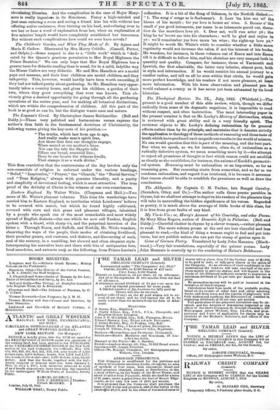This firm conviction that the controversies of the day involve
only the non-essentials of religion is enforced under the various headings, "Belief," "Inspiration," "Prayer," the "Church," the "Burial Service," and "True Religion," always with genuine liberality, and a purity and simplicity of devotional feeling, which is most attractive. The true proof of the divinity of Christ is the witness of our own consciences. Eastern England By Walter White. (Chapman and Hall.)---Two more of Mr. White's pleasant volumes. This time his wanderings have carried him to Eastern England, to territories which Londoners' believe to be covered with marsh, but which he found highly cultivated, covered with corn and rich grass and pleasant villages, inhabited by a people who speak one of the moat remarkable and most widely spread of English dialects—the one which we now call Yankee, English spoken with a drawl, with sharp a's, and the perpetual insertion of the letter e. Through Esaex, and Suffolk, and Norfolk, Mr. White wanders, observing the ways of the people, their modes of obtaining livelihood, their peculiar games, and customs, and dialects, and discoursing of each, and of the scenery, in a rambling, but shrewd and often eloquent style interspersing his narrative here and there with bits of antiquarian lore, local anecdotes, and extracts stieji as the following, from Prince Luoien's collection. It is a bit of the Song of Solomon, in the Norfolk dialect t- " 1. The song o' songs as is Sorlomun's. 2. Lerr 'im kiss me wi' the kisses of his mouth ; for yar love is better an' wine. 3. Beeaze o' the smell o' yar good intements, yar name is as intements pored oat, there- foor da the mawthers love ye. 4. Dror me., we'll run toter ye ; the king he ha' browt me into his charmbers : we'll be glad and rejice in ye : we'll remahmber yar love more 'an wine ; the right-up love ye," It might be worth Mr. White's while to consider whether a little more regularity would not increase the value, if not the interest of his books. He wanders, for instance, in these volumes out of Essex and into Essex till it is difficult to follow him, and his sketches are very unequal both in quantity and quality. Compare, for instance, those of Yarmouth an Ipswich, the first admirable, the latter very inferior, almost poor, both in style and information. If he would restrict his annual journey to a, smaller radius, and tell us all he sees within that circle, he would 04 more perfect knowledge, and his readers if not more pleasure, et Iowa more information. With his keen observation and pleasant pea ba would exhaust a county as it has never yet been exhausted by ita local historian.






























 Previous page
Previous page